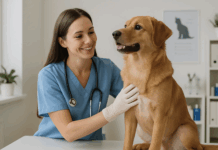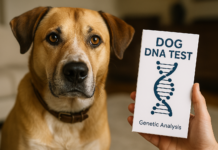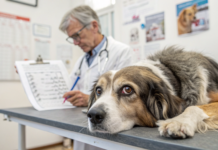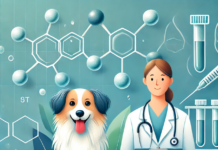Last Updated on August 19, 2022 by Dogs Vets
Dog Teeth Braces – Why Do Dogs Need Braces?
If your dog’s teeth are crooked, it may be time to get your dog teeth straightened. You can put braces on your dog’s teeth if they have a serious problem.
The vet will assess your dog’s mouth and teeth to make sure that they’re a good candidate.
Once approved, your veterinarian will apply the braces and closely monitor your dog’s teeth development. The procedure can take anywhere from 30 to 90 minutes, depending on the severity of your dog’s problem.
Does Your Dog Need Braces
Your dog can benefit from braces. Many of the breeds have crooked, protruding teeth. This can be painful for the dog and can lead to tooth-to-tooth contact.
Your dog can also develop overcrowding when the permanent teeth come in, which can also cause discomfort. Braces can help reposition the teeth and prevent these issues. Read on to learn more about the benefits of braces for dogs.
Having braces fitted on a dog can improve their smile and eliminate discomfort. The treatment will take a few weeks to several months. Braces will require daily brushing and the dog should avoid hard chew toys.
Your vet will explain the procedure in detail and help you decide if braces are right for your dog. The procedure can take anywhere from six weeks to a year, and your vet will give you advice on how to keep them clean and healthy.
Some dogs need braces for their hips. Various dog breeds have varying degrees of hip problems, and braces can help.
While some breeds of dogs are more susceptible to hip problems than others, these braces can be an excellent alternative to surgery for a dog with this problem.
Orthopedic braces are often made of high-quality webbing and spacer mesh that are adjustable to fit your dog’s individual needs.
Why do dogs teeth get crooked
Your dog’s crooked teeth are mostly the result of genetics and usually do not need any treatment. However, if your pooch is showing signs of discomfort while chewing or if it is causing him to have trouble waking up in the morning, he should visit a veterinarian to determine the cause of the problem.
Your vet may recommend teeth extraction, filing, or braces to correct the problem. The process should only take a few months.
Your vet will check for crooked teeth during regular checkups, and he or she may recommend a veterinary dental specialist to help with the problem.
View this post on Instagram
Crooked teeth are often a sign of periodontal disease, which is an underlying condition that causes food to stick to teeth and bacteria to multiply without regulation. This condition may be detected through vaccinations, or by the appearance of an unnatural bite or excessive saliva production.
Can you put braces on dogs teeth
Dogs can have braces placed on their teeth for a variety of reasons, including alignment problems. In most cases, the braces are attached under anesthesia.
The procedure usually takes from 30 to 90 minutes. After your dog is anesthetized, he or she will be ready for braces. However, there are a few things you should know before scheduling the procedure.
- First, your dog must be healthy enough to undergo anesthesia.
- Another reason to place braces on your dog’s teeth is to correct lance teeth.
Dogs commonly suffer from forward-aligned upper canines.
These teeth can cause unnatural tooth-to-tooth contact, resulting in a higher risk for periodontal diseases and ulcers.
Dogs with lance teeth are often uncomfortable and have difficulty eating properly. By adjusting their teeth, you can reduce their discomfort and increase their chances of a healthy, long-lasting life.
Depending on the severity of your dog’s dental issues, dog braces can cost between $1,500 and $5,000. The cost will vary depending on the size and type of braces needed, as well as the veterinarian visits required to maintain the braces.
You should also consider pet dental insurance, which may help cover the cost. If you are unable to afford the procedure, it is best to find a vet that will help you pay for the procedure.
How much does dog teeth braces cost
If your dog’s teeth are misaligned, dental braces may be an option. While a dental procedure for humans can be expensive, a dog’s dental braces will be much less expensive.
This type of treatment requires professional care, which is why a veterinary clinic or a dental specialist is the best choice for your dog. There are also some pet insurance plans that cover the expense of dog dental braces.
The cost of dental braces depends on the severity of the misalignment and general health of the dog.In general, dog braces cost between $2,000 and $5,000. However, the cost varies on a number of variables, including the size of your dog, its dental condition, and the length of time it must wear braces.
Typically, dogs will need to wear braces for 6 months to one year.
In some cases, the procedure can last up to two years, but you should expect this timeframe to be longer if the malocclusion is severe. Regardless of the cost, it is worth it for your dog’s health.
View this post on Instagram
Dental braces for dogs are typically very affordable compared to human braces. Since they don’t require any invasive dental procedures, the process is much faster than for humans.
Plus, dog teeth have a much quicker developmental process than human teeth, so they can be moved in a matter of weeks instead of months.
The entire process can be done without the need for additional anesthesia. The procedure can also be done over a short period of time, so a dog can get braces within a couple of months.
How can I straighten my dogs teeth
For dogs that have overbites, one of the best ways to straighten their teeth is to straighten their bite. Overbite can be a genetic problem that causes the teeth to become crooked.
This condition is more common among breeds with narrow, pointed muzzles.
To correct this issue, your dog will need to be given regular dental checkups to ensure that the braces are working properly. If your dog suffers from overbites, it may be time to visit a veterinary clinic.
Dental issues are just as common in pets as in people, but the treatment options are often less extensive. The most common solution is to place dog braces, but only in certain cases.
For instance, dogs with severely crooked teeth can’t open their mouths properly, making chewing difficult.
Similarly, bad breath and tooth decay may result from improper dental health. Having misaligned teeth can lead to various types of dental problems, such as bad breath and gum injuries.
Do dogs teeth shift with age
As your dog ages, you may notice that his or her teeth begin to shift and fall out. While this is completely normal, you can make it much worse by taking your dog to a dentist every few months for professional cleanings and checkups.
If you notice that your dog’s teeth are loose or shifting, you should take your dog to a veterinarian right away. Teeth shifting can be caused by a number of different factors, including poor nutrition and dental health.
Puppy and kitten teeth are common during this time, but your dog will lose its baby teeth around the age of six or seven months.
Eventually, adult teeth will replace the baby teeth. Your dog will begin to chew on things to loosen and relieve the discomfort of erupting adult teeth. Adult teeth should last throughout your dog’s lifetime, but in some cases, periodontal disease and trauma can cause them to lose their teeth prematurely.
Can I fix my dogs underbite
In some cases, a simple surgical procedure can correct your dog’s underbite. This type of dental condition is called malocclusion and is usually caused by the relative positioning of the upper and lower jaws.
Dogs often have this condition, but it can also result from dental problems or an accident. In such cases, a canine dental specialist can help you choose the best treatment.
There are many benefits to dog teeth braces, starting with the obvious one of improving your dog’s appearance.
Dog teeth braces can help your dog look more attractive and have a better bite, as well as improve their chewing power. They can also help your dog’s digestive system by improving its chewing power. Unlike human teeth, a dog’s underbite can cause pain and can lead to a host of other dental problems.
An underbite can also lead to other problems down the road, including dental infection and increased risk of heart disease and diabetes.
A veterinarian can help you determine the extent of the underbite in your dog, as well as examine your dog’s mouth for signs of pain and infection. Once the vet has determined the extent of the problem, your dog can undergo the necessary dental treatment.
You will be amazed at how quickly your dog will look after the procedure!
Does an underbite hurt a dog
There are different ways to treat underbites in dogs. While most dogs experience only slight irritation, more severe cases may result in significant discomfort.
Underbites should be checked by a veterinarian as they can lead to an infection or significant pain. In severe cases, your dog may need to be on a special diet.
Your veterinarian will be able to prescribe the appropriate treatment and make recommendations. You can also give your dog a bite guard to protect their teeth while chewing.
For older dogs with an underbite, early treatment can help prevent dental problems. Older dogs may develop gingivitis, which is a symptom of a dental infection.
Your dog may also have bad breath and blood in its saliva. Early intervention can also be beneficial for kittens with an underbite.
A veterinarian will usually refer your pet to a veterinary dental surgeon who will help treat your dog’s condition. The vet may recommend removing a tooth or reducing the height of the canine teeth. He or she may also use orthodontic appliances to shift the teeth.
Facts Check
We hope you enjoyed this article… What are your thoughts on Why Do Dogs Need Braces?
Please feel free to share this article!
![Dog Teeth Braces - Why Do Dogs Need Braces? [Cost + Dog Underbite] Dog Teeth Braces - Why Do Dogs Need Braces? [Cost + Dog Underbite]](https://dogsvets.com/wp-content/uploads/2022/08/Screen-Shot-2022-08-19-at-8.38.26-AM-e1660894746780-696x470.png)






















